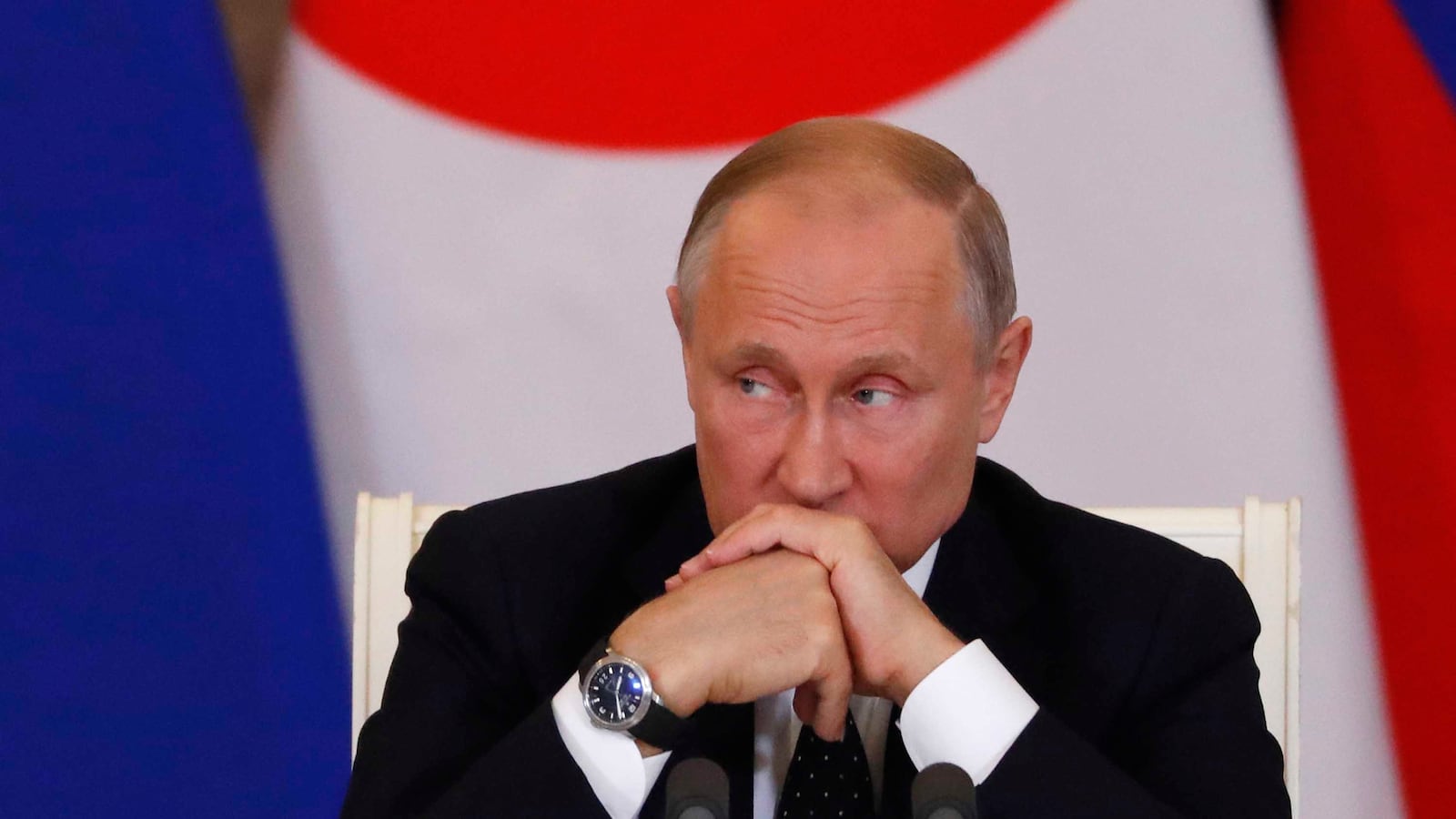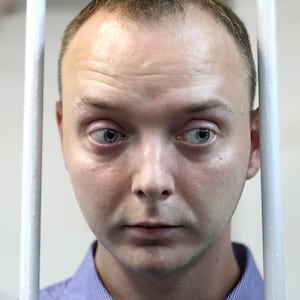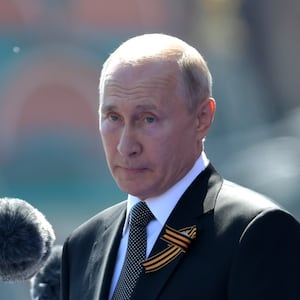MOSCOW—The newsroom at Dozhd, or TV Rain in English, was buzzing on Monday, three days after the Kremlin had designated the outlet—the only independent TV channel in the country—as a “foreign agent,” casting its future into doubt.
Instead of throwing in the towel, the channel’s 170 employees have been determined to carry on despite constant threats, lawsuits and persecutions. As Russia’s only television channel covering national and foreign news without state censorship, its coverage of the Kremlin’s political opposition is all but certainly the cause of its problems today.
Russia is in the midst of one of the harshest crackdowns on journalism in its post-Soviet history: dozens of the country’s reporters are essentially being labelled state enemies. Individual reporters face significant fines or arrest for receiving foreign funding or just reposting news published by media designated as “foreign agents.” This black label obliges journalists to mark every post with the label, otherwise they are forced to pay fines.
But the consequences of the label go beyond that: to the Russian ear, the word “agent” sparks suspicion. The “foreign” term, too, is meant to push readers and viewers away, considering many generations of Russians have lived with a barrage of anti-West propaganda throughout the Soviet period.
Who made the decision to turn TV Rain into the state’s enemy? The channel’s editor-in-chief, Tikhon Dziadko, has no doubts: “Nobody could make such a decision without Putin. He never liked our channel,” Dziadko told The Daily Beast.
In the past, Russian authorities have criticized the U.S. for designating the Kremlin’s key television channel for foreign audiences, Russia Today, as a “foreign agent.” But to TV Rain, that comparison does not make sense: it is a popular, law-abiding, and most importantly, Russian media outlet with transparent finances.
Dziadko says that the channel had received about $67,000 in grants from Russian and foreign organizations back in 2016, and reported those funds to state authorities. “We cannot be compared to RT being a ‘foreign agent’ in the U.S., since we are a well-known Russian television channel” broadcasting in Russia, anchor Ekaterina Kotrikadze told The Daily Beast. “Imagine Biden banning Fox News now for criticism, that would be the equivalent.”
TV Rain’s problems began in May, when the channel was excluded from the Kremlin’s press pool. “Our foes gave us a signal: you don’t have the protection any longer,” Dziadko says. The presidential press secretary, Dmitry Peskov, declared that TV Rain was to be punished for its calls for “illegal actions.” Peskov had personally visited its studios in the past for an interview and seemed friendly with the channel, but in this case, he clearly couldn’t help. There was a sense that the decision was made by “the boss,” Putin, who has seemingly grown tired of criticism from the network.
Russia’s Channel One presenter, Vladimir Pozner, has been calling for TV Rain to defend its reputation, appeal the state’s decision in court, and continue to work. “There is no use in this, more damage is done by the designation, which reminds me of the USSR, where there was no independent media, so by my data about 40 million listened to so-called ‘enemy voices,’ BBC, Radio Liberty or Deutsche Welle,” Pozner said on TV Rain on Tuesday. “As soon as they limit the media, people immediately begin to look for real information.”
TV Rain was founded in the midst of Russia’s political thaw of modernization and a re-set of relations with the United States in 2010, a year after President Barack Obama visited Moscow. It quickly became popular with Russian hipsters, young people and intellectuals. The 34-year-old Dziadko stepped in as the channel’s editor-in-chief in 2019. Dziadko, a tall, slim and incredibly fast thinking journalist, comes from a well-known family of dissidents. His grandmother, Zoya Krakhmalnikova, was arrested by the KGB and sent to Gulag in 1982 for publishing literature banned by the Soviet Union. Dziadko emerged as a star reporter at TV Rain during a wave of huge opposition protests, prior to Vladimir Putin’s third inauguration in 2012.
The channel has faced constant threats for its coverage throughout its 11-year history. It was evicted from its studio in 2014, a few months after Crimea annexation. TV Rain’s reporters have been detained, fined, and arrested. There was, however, a time when the Kremlin believed in modernization, new technologies and independent Russian media, especially TV Rain. President Dmitry Medvedev visited the channel in 2011. The network’s founder, Natalia Sindeyeva, gave the Russian leader a tour of the studio. “That country of modernization is long gone,” Sindeyeva told The Daily Beast.
Two years ago, when authorities prohibited independent candidates from running in local elections, the channel made the decision to stream news for free on YouTube. “The number of our subscribers, YouTube followers rocketed up, millions watch our coverage now, that might have been the main reason for the crackdown,” Sindeyeva said. “I still don’t know what goal authorities have; for as long as there is TV Rain, Russia has a drop of freedom but if we get destroyed, many will see it as a signal to escape from the country.”
On Monday, the Presidential Council for Civil Society and Human Rights met with public officials from the Ministry of Justice to ask how Russian media outlets can defend themselves from the “foreign agent” law and the reasoning behind the designations. The answers were shocking: any journalist who wins a foreign award and whose travel expenses are covered by a foreign organization can be designated as a “foreign agent.” Furthermore, if journalists receive money, even as a birthday present from their family members abroad, that alone could warrant a label.
“I cannot see without tears how Elizaveta Mayetnaya publishes a picture of her little child and signs with that Caps Lock text,” a member of the Presidential Council for Civil Society and Human Rights, Eva Merkacheva, wrote in a post on Facebook on Monday. “All journalists are potential foreign agents.”
Dziadko compared the Kremlin’s attacks on TV Rain’s reporters—who have covered dangerous warzones, devastating forest fires, and violent police crackdowns—to political repression in Belarus. Neither Sindeyeva nor Dziadko have any intention to reach out to Putin.
“I would not meet with Putin now, we speak different languages, so that would be absolutely useless,” Dziadko told The Daily Beast. “Me and 170 people working at TV Rain are the real Russian patriots, but every year we understand less and less where exactly authorities are leading our country.”



